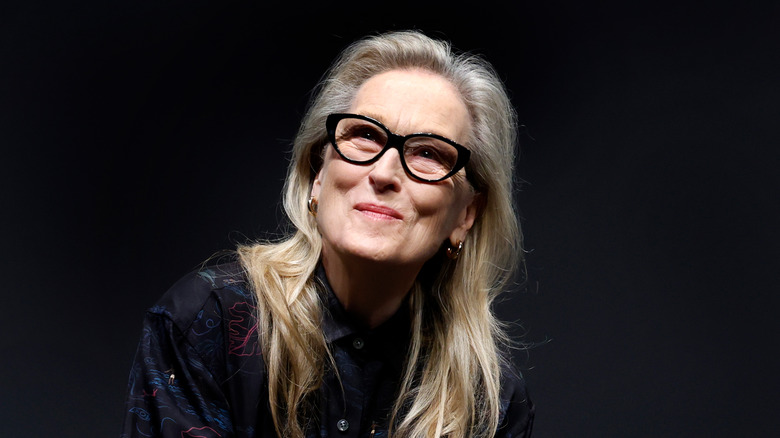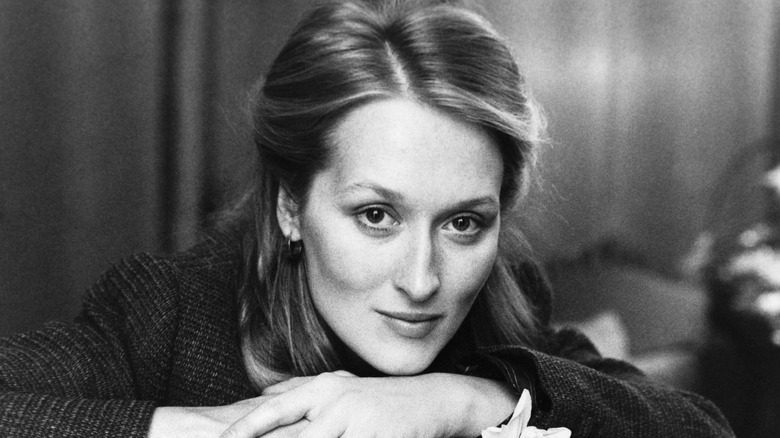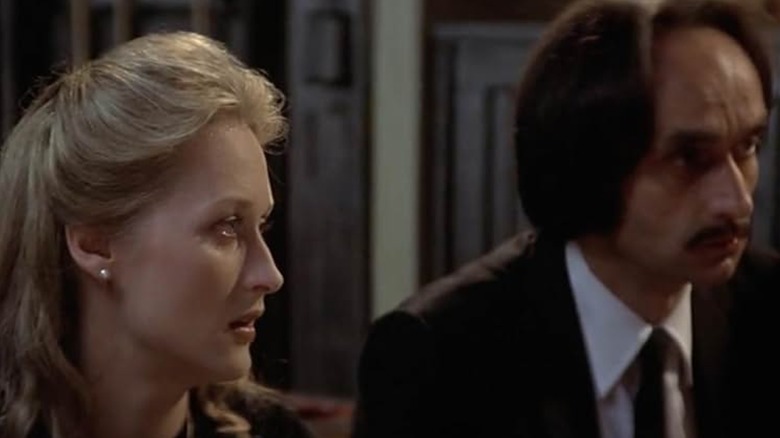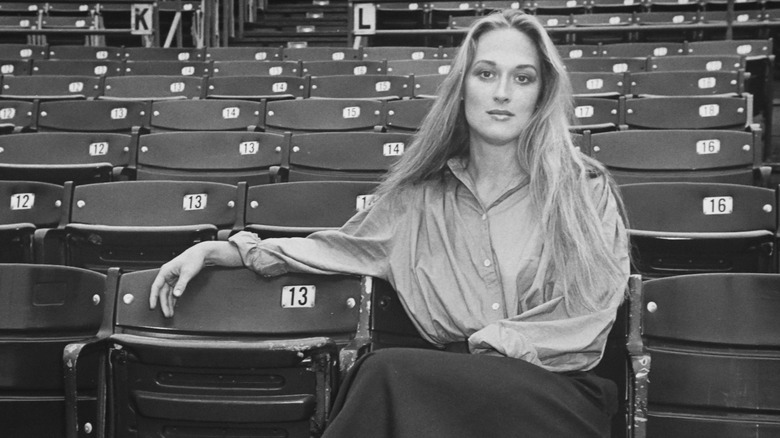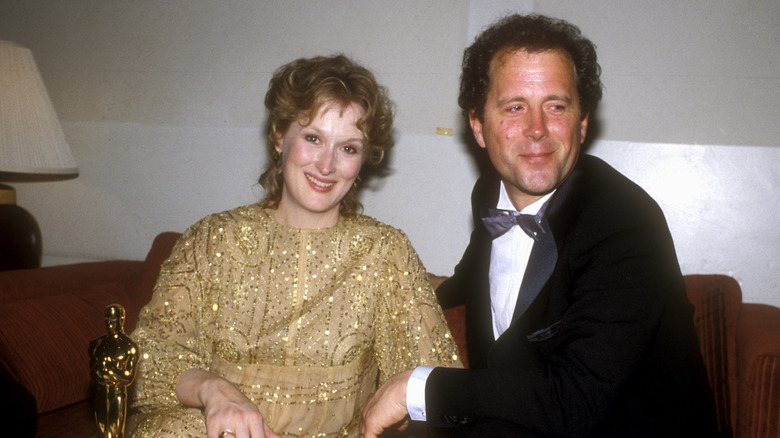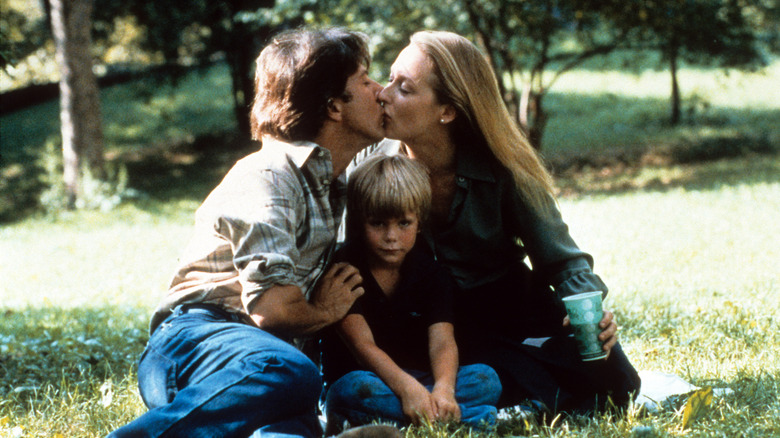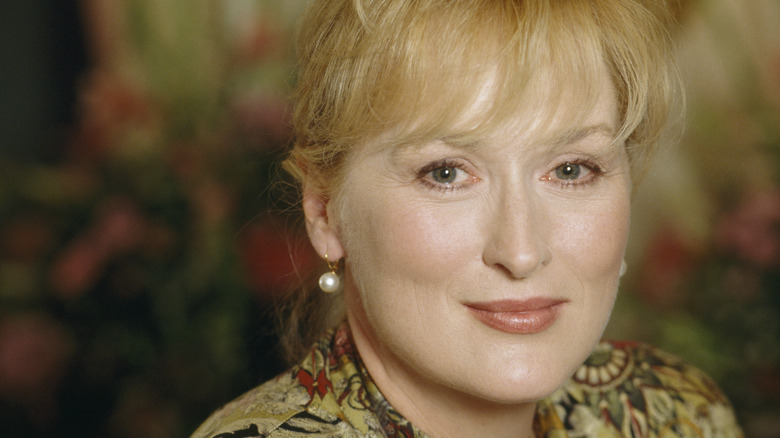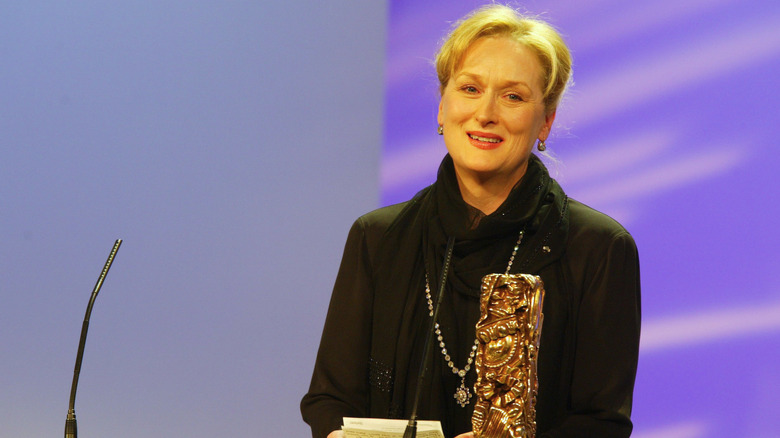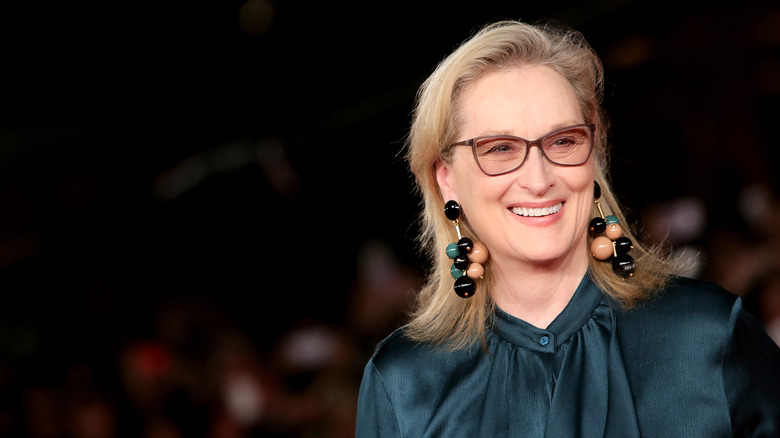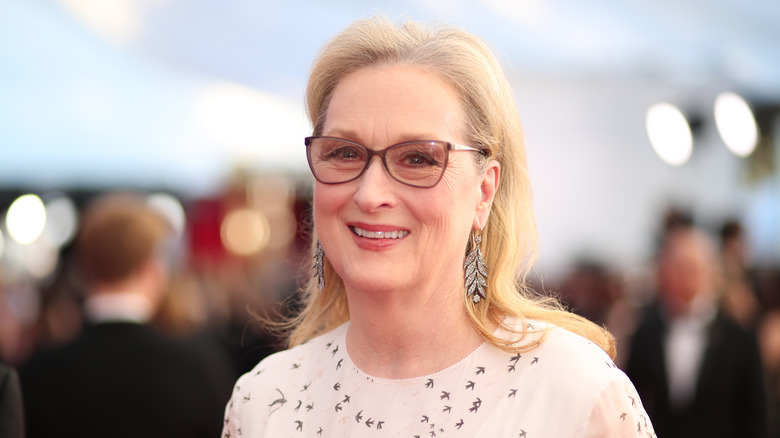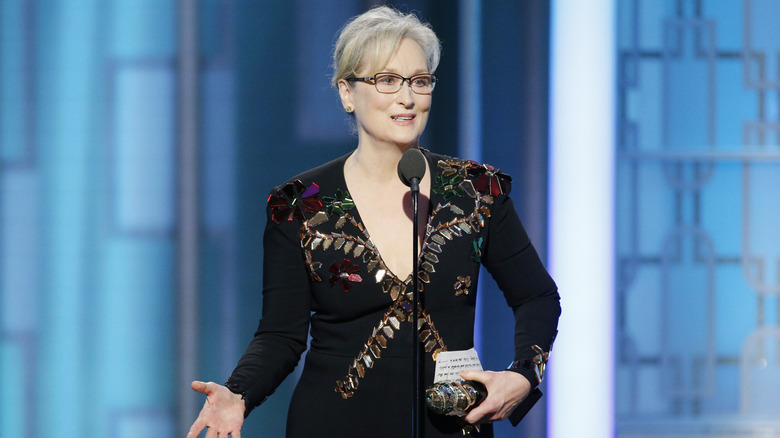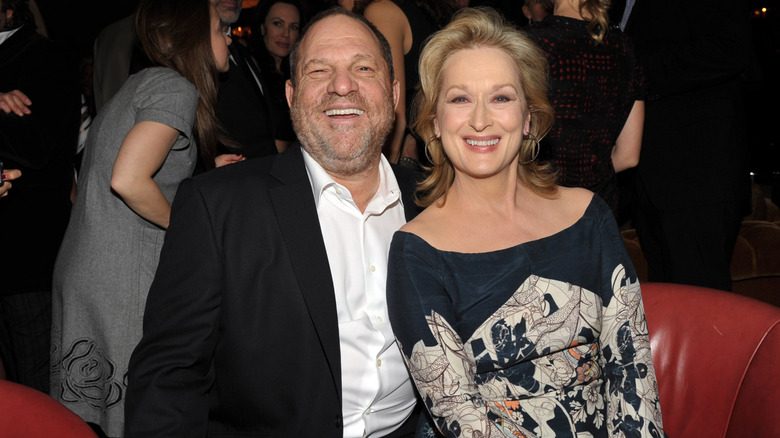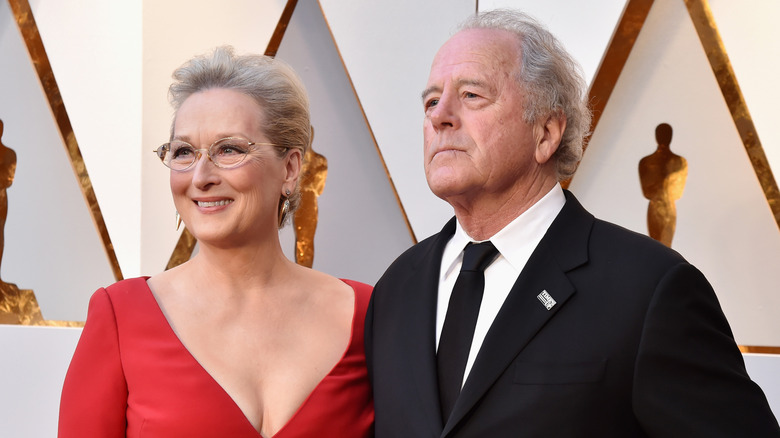Tragic Details About Meryl Streep
Tragedy isn't among the first things that may typically come to mind when one thinks of Meryl Streep. Glittering awards, iconic films, unforgettable performances, cinema history, and her untouchable place within it are. But behind the critical acclaim and trademark poise that define Streep's legacy lies a story shaped as much by grief and heartbreak as by talent. This duality started early. Streep was held to lofty standards of work that doubtless carried many inherent pressures. These tragic undercurrents flowed over into her adult life as an actor, and she was forced to reckon with profound personal losses and changes that could have ended lesser careers.
Held together by a strong front, an iron will, and once-in-a-generation talent, Streep went from milestone to milestone and established herself as a cinema icon, all while grappling with personal trials that rarely had public attention. From dealing with the invasive scrutiny that dogged her monumental fame to fighting for her rightful place in films, Streep has traced a journey that, though luminous, has been laced with a sense of melancholy. Here are some of the tragic details about Meryl Streep that have shaped her life the most.
The pressure of perfection tailed Meryl Streep all through her youth
Great talent can be as much a burden as a gift, and Meryl Streep learned this long before she came to Hollywood. The seeds of this wisdom were planted in school, when she changed her persona from "a bossy little bully sort of girl" — as mentioned in her biography "Her Again" — to an all-arounder who excelled at everything from cheerleading to musical productions to council leadership. As the author of the biography, Michael Schulman, wrote: "It was kind of like winning best actress of her high school" (via NPR).
Her acting genius followed Streep to college, where it both impressed and intimidated her peers. Getting cast in every production at Yale Drama School did not win her many friends. And so Streep asked the school if she could bow out of a few roles. "No, you're too good. You have to be in every play," was the response.
Her boyfriend John Cazale was diagnosed with cancer
Meryl Streep had already embedded herself in New York's theater scene when she crossed paths with John Cazale in the 1970s. Cazale was a masterful actor who had entered Hollywood guns blazing as Fredo Corleone in "The Godfather" (and its sequel). He was also already a major star when his relationship with Streep blossomed during a production of Shakespeare's "Measure for Measure." Their whirlwind romance moved quickly. Streep and Cazale began living together during this period and were nothing short of a theater power couple, given their respective stage cred. But then, in 1977, just a year into their relationship, tragedy struck. Cazale was diagnosed with lung cancer.
The diagnosis loomed over their love life, but Streep was not one to stand as a passive witness to her boyfriend's deteriorating health. As her biography "Her Again" details, Streep remained dignified in the face of the distressing diagnosis. Despite the terminal nature of the disease, she worked hard to cover Cazale's medical bills, including on the 1978 miniseries "Holocaust," according to The New York Post. But as only Streep could, even under the crushing knowledge of her boyfriend's impending death, she delivered an Emmy-winning performance in it, which earned her wider screen recognition than ever before. That same year, Streep and Cazale co-starred in the film "The Deer Hunter," which won several Oscars (including best picture) as well as a nomination for Streep in the best actress category.
After his tragic death, she was a changed woman
For the final few months of John Cazale's life, Meryl Streep was by her dying boyfriend's side. "She was always a strong-willed, persistent, hopeful person, and I think she just applied all her spirit and strength to taking care of him," author Michael Schulman, who interviewed Streep extensively for "Her Again," wrote. Streep was in the room when Cazale died in 1978. Streep cried and pounded on Cazale's chest after he seemed to have died. He opened his eyes briefly then to console her — "It's all right, Meryl" — before drawing his last breath.
After Cazale, who is still remembered as one of the greatest loves of Streep's life, she was a changed woman. "I was emotionally blitzed. All my energy was channeled into my work," she told Time. "It was a selfish period, a period of healing for me, of trying to incorporate what had happened into my life. I wanted to find a place where I could carry it forever and still function." Incidentally, this phase also marked the start of the creation of Streep's legend as she picked up one distinction after another for her acting genius on the big screen. The awards acclaim "The Deer Hunter" brought her kick-started this to a great degree.
Meryl Streep's marriage to Don Gummer soon after was questioned by many
Meryl Streep was still reeling from the loss of John Cazale when sculptor Don Gummer entered her life. The two were introduced by Streep's brother, who was helping the actress move after Cazale's death. It so happened that Streep eventually ended up shifting into Gummer's own apartment when he was away for a brief time, and they began corresponding through letters. It took a while for Streep's friendship with Gummer to take a romantic turn. But when it did, the relationship moved quickly and culminated in marriage in a matter of six months.
Streep and Gummer's wedding in September 1978 invited some predictable scrutiny, with those close to Streep questioning the reasons behind her decision to shift gears so soon after the tragedy of Cazale's death. "It just seemed right," Streep told Ladies' Home Journal. "A lot of men had asked me to marry them, but it had never really seemed right before" (via Simply Streep). Friends and family of Streep apparently had conflicting opinions on the whole affair, with "Her Again" mentioning that the marriage even sparked tensions in the actress's relationship with her mother. Regardless, Streep persisted, having found an anchor who helped rebuild her life.
The success of her film 'Kramer vs. Kramer' hid some dark truths
Meryl Streep's career was already on a steady ascent when "Kramer vs. Kramer" rolled around. The 1979 legal drama brought with it Streep's first Oscar win, a stunning breakthrough that cemented her status as a revered actor, and lots of dark behind-the-scenes truths. Legend suggests that the line between art and reality was disturbingly blurred through the shoot of the film, which stars Streep and Dustin Hoffman as Joanna and Ted, a couple going through a bitter divorce. A major pressure point in their dynamic was Hoffman's use of harsh (sometimes troubling) Method acting techniques, which included taunting Streep about her late boyfriend and smashing glass to provoke a reaction from her, according to Vanity Fair.
One of the most concerning of such allegations was about Hoffman's alleged assault of Streep during filming — something that came to light decades later when she was interviewed by The New York Times. "[T]his was my first movie, and it was my first take in my first movie, and he just slapped me. And you see it in the movie. It was overstepping," she said, talking about her tense relations with the Hollywood icon. Streep also famously fought with the filmmakers to give her character more depth and dimension, even writing her own courtroom monologue, but as criticism for "Kramer vs. Kramer" pointed out, the film's redemption arc remained skewed in favor of the male lead.
Meryl Streep's fame began to threaten her privacy — and she wasn't too happy about it
Meryl Streep's rise to fame in the 1970s and '80s was dramatic. And as it always does, such stardom came with inevitably high levels of interest in her celebrity. Streep was not too happy about it. As a notoriously private person, the "Sophie's Choice" actor felt a growing discomfort as intense media coverage and real-time fanfare intruded into her personal life. In an interview with Time, Streep, fresh off the fame of "Kramer vs. Kramer," said: "For a while there it was either me or the Ayatullah on the covers of national magazines. It was excessive hype." Ironically, this interview was part of Streep's debut on the magazine cover, her unease with which she spoke about elsewhere.
"It made me sick inside," Streep told "Today" about her momentous Time cover. "[I]t does make things difficult with my friends," she added, talking about the dark side of fame that was trailed by feelings of jealousy and competitiveness among industry colleagues. As if that wasn't enough, Streep also became something of a public spectacle to the point that she couldn't even sit on a park bench without attracting attention. Her resounding fame also took a toll on her outings with her husband, and in a bid to secure her privacy, Streep even invested in a wig — but to no avail. Her unmistakable presence showed through her disguise, and people recognized her regardless.
She has seen Hollywood's sexist side up close
Meryl Streep has pulled back the curtain on Hollywood's sexist structures many times throughout her decades-long career, which is punctuated with her own experiences of it. Much of it, by her own admission, came about during her youth. "I have experienced things, mostly when I was young and pretty ... back in the day, when everybody was doing cocaine, there was a lot of [expletive] behavior that was inexcusable," she told The New York Times, adding without further explanation that she "was really beaten up." But even as her career skyrocketed post "Kramer vs. Kramer," the problem of sexism remained; it just happened to take on a different dimension.
The pay gap became more apparent to Streep over the years and, as she told Variety, it wasn't until "The Devil Wears Prada" happened in 2006 that she managed to protest the inadequate paycheck she was getting. "There was my 'goodbye moment,' and then they doubled the offer. I was 55, and I had just learned, at a very late date, how to deal on my own behalf." While Streep eventually learned to negotiate better deals for herself as one of Hollywood's most beloved A-listers, her fight against the industry's sexist standards wasn't just for her own good. She became a voice for gender issues that plague the industry, such as gender imbalance among film critics and inherent storytelling bias.
Meryl Streep has also had to stand up to ageism
Meryl Streep may be in her late 70s and still smashing it out of the park with lead roles. But her journey through Hollywood's notoriously ageist environment — where the careers of many female stars come prestamped with arbitrary expiration dates — has been far from easy. As she has repeated time and again, Streep felt 40 was a decisive juncture for her. "I remember turning to my husband and saying, 'Well, what should we do? Because it's over,'" she told British Vogue in 2012, the year she made her cover debut as one of the magazine's oldest front-page models at 62. "Once women passed childbearing age they could only be seen as grotesque on some level."
Streep's understanding of Hollywood ageism isn't imagined; it is rooted in her firsthand experience of a shift in the kind of roles that came her way once she turned 40. "When I was 40, I was offered three witch [roles]. ... I was offered witches because I was 'old' at 40," she said (via ABC News). Unlike with many of her contemporaries, Streep's pushback against the industry trend of phasing women out after a certain age is more than just rhetoric. In 2015, she put her money where her mouth was and funded the Writers Lab, a breakthrough initiative to support women screenwriters over the age of 40.
In the age of social media, even Meryl Streep is not immune to controversy
Meryl Streep may be Hollywood royalty, but the advent of social media has leveled the playing field in a lot of ways. So much so that even celebrities once considered untouchable cannot expect to go scot-free if they slip up. Meryl Streep is more than familiar with this phenomenon, having weathered several online firestorms in recent years — even in the absence of any social media presence. During promotions for "Suffragette" in 2015, Streep had controversially referred to herself as a "humanist" when Time Out London asked for her stand on feminism. "I am for nice easy balance," she said, in what many saw as a betrayal of Streep's otherwise outward advocacy of gender rights.
The irony of it all, given the subject matter of the film, was hard to ignore for many supporters of the feminist movement. That same press engagement embroiled Streep in yet another controversy after she — along with co-stars Carey Mulligan, Romola Garai, and Anne-Marie Duff — posed for the magazine in a T-shirt that read: "I'd rather be a rebel than a slave." The slogan was taken from a speech suffragette leader Emmeline Pankhurst gave in 1913, but according to critics of this promo campaign, it carried a racially insensitive tenor when removed from its historical context. The backlash against Streep was swift and intense, an early echo of the social media wrath she would face in the future.
When Meryl Streep locked horns with Donald Trump, the backlash was intense
At the 2017 Golden Globes, Meryl Streep came up on stage to accept the Cecil B. DeMille Award. In doing so, she delivered a powerful, headline-making speech that ruffled feathers in the Republican camp. "It was that moment when the person asking to sit in the most respected seat in our country imitated a disabled reporter, someone he outranked in privilege, power, and the capacity to fight back," Streep said. "When the powerful use their position to bully others, we all lose." Though Streep didn't take any names, it was clear she was speaking about President Donald Trump, who had appeared to mock a reporter at a rally.
Streep's speech came out as a highlight of the awards show, attracting both wide praise and intense trolling. Conservative commentators and Republican leaders pushed back against the "Don't Look Up" star and, simultaneously, Hollywood elitism. Leading the troll army was Trump himself, who took to X the morning after and stoked the fire, calling Streep "one of the most over-rated actresses in Hollywood ... a Hillary flunky who lost big." The incident was only the beginning of the Streep vs. Trump saga, given that he was on the verge of taking office. After Trump arrived in the White House, attacks and counterattacks from both sides escalated, and Streep became a repeat target of Republican backlash.
She was scrutinized for her alleged closeness to Harvey Weinstein
2017 was also the year movie magnate and convicted sex offender Harvey Weinstein was publicly exposed for decades of sexual misconduct. As dozens of disturbing accusations came to light, fueling the #MeToo and #TimesUp movements, major Hollywood stars and their alleged ignorance of Weinstein's crimes were at the center of this scandal. One of the biggest names that faced scrutiny was Meryl Streep, who had worked with the producer on several films, including "The Iron Lady" and "August: Osage County." It didn't help her position that she had notoriously venerated him as "God" during an award acceptance speech in 2012.
Streep's relationship to Weinstein was publicly dissected on social media, and vocal critics like Rose McGowan — a Weinstein survivor — also called the actor out for her prolonged silence on the matter. Around the same time, posters appeared across Los Angeles showing Streep's face next to Weinstein's with the alleged incrimination that "she knew." Streep denied the charge and, in a statement to HuffPost, emphasized: "I did not know about Weinstein's crimes ... He needed me much more than I needed him and he made sure I didn't know." In 2018, Weinstein's legal team reportedly cited old statements from Streep to defend him in court, which she condemned as "pathetic and exploitive."
Meryl Streep split from her husband after decades together
In 2023, Meryl Streep's decades-long marriage to Don Gummer came to an end, with an official announcement from the actor confirming their divorce. "[W]hile they will always care for each other, they have chosen lives apart," Streep's statement to Page Six read, noting that the duo had been separated for six years before that. Streep and Gummer, who share four children, were last seen together at the 2018 Oscars, when they must have apparently been going through their separation in private. That the world had no knowledge of their split was in keeping with Streep's record of maintaining a tightly guarded relationship with Gummer.
"Goodwill and willingness to bend — and to shut up every once in a while," she told Vogue in a rare divulgence, when asked about the secret behind her healthy marriage. But the quiet dignity with which she navigated the public part of her divorce — without any messy drama or disputes — was rather on-brand for Streep who, despite her status as one of the most decorated stars in the world, has managed to keep the innermost details of her private life under wraps. That discretion has also carried over to her rumored romance with Martin Short, speculation around which has abounded since 2024. Streep and Short have been longtime colleagues, but fans claim that their growing chemistry while working together on "Only Murders in the Building" is indicative of something more than friendship.
